Читать книгу (ISC)2 CISSP Certified Information Systems Security Professional Official Study Guide - Mike Chapple - Страница 35
Availability
ОглавлениеAvailability means authorized subjects are granted timely and uninterrupted access to objects. Often, availability protection controls support sufficient bandwidth and timeliness of processing as deemed necessary by the organization or situation. Availability includes efficient uninterrupted access to objects and prevention of denial-of-service (DoS) attacks. Availability also implies that the supporting infrastructure—including network services, communications, and access control mechanisms—is functional and allows authorized users to gain authorized access.
For availability to be maintained on a system, controls must be in place to ensure authorized access and an acceptable level of performance, to quickly handle interruptions, provide for redundancy, maintain reliable backups, and prevent data loss or destruction.
There are numerous threats to availability. These include device failure, software errors, and environmental issues (heat, static electricity, flooding, power loss, and so on). Some forms of attack focus on the violation of availability, including DoS attacks, object destruction, and communication interruptions.
Many availability breaches are caused by human error, oversight, or ineptitude. They can also occur because of an oversight in a security policy or a misconfigured security control.
Numerous countermeasures can ensure availability against possible threats. These include designing intermediary delivery systems properly, using access controls effectively, monitoring performance and network traffic, using firewalls and routers to prevent DoS attacks, implementing redundancy for critical systems, and maintaining and testing backup systems. Most security policies, as well as business continuity planning (BCP), focus on the use of fault tolerance features at the various levels of access/storage/security (that is, disk, server, or site) with the goal of eliminating single points of failure to maintain availability of critical systems.
Availability depends on both integrity and confidentiality. Without integrity and confidentiality, availability cannot be maintained. Concepts, conditions, and aspects of availability include the following:
Usability: The state of being easy to use or learn or being able to be understood and controlled by a subject
Accessibility: The assurance that the widest range of subjects can interact with a resource regardless of their capabilities or limitations
Timeliness: Being prompt, on time, within a reasonable time frame, or providing low-latency response
